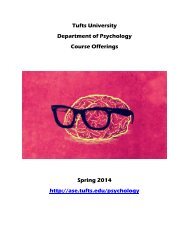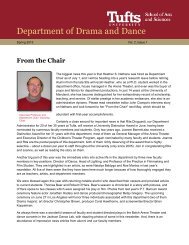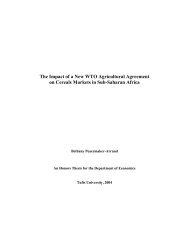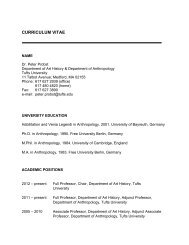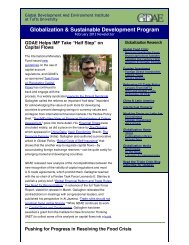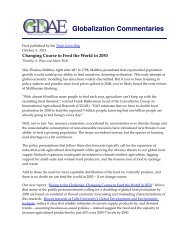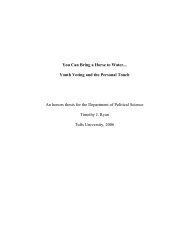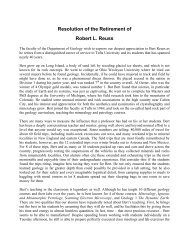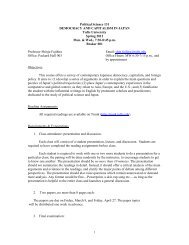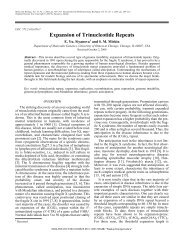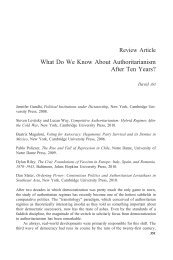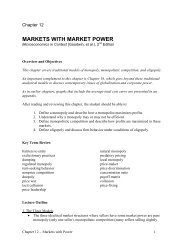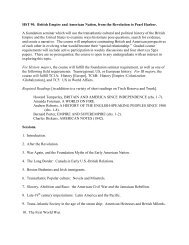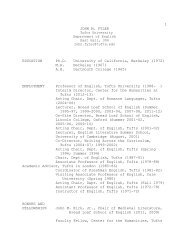Habitats: Guide to On-Campus Living - Tufts University
Habitats: Guide to On-Campus Living - Tufts University
Habitats: Guide to On-Campus Living - Tufts University
Create successful ePaper yourself
Turn your PDF publications into a flip-book with our unique Google optimized e-Paper software.
48<br />
> Suspension of Visitation Privileges – if a guest of a resident has violated university residential<br />
policy the host resident may lose their right <strong>to</strong> have guests or a particular problematic<br />
guest in their university residence. Suspension of visitation privileges may<br />
also be imposed if a student chronically violates the guest policy by allowing their<br />
guest <strong>to</strong> stay longer than the allotted time stated in the guest policy.<br />
> Suspension of Visitation Privileges <strong>to</strong> another residence hall – this consequence is<br />
imposed if a resident student enters a residence hall other than their own and creates a<br />
disturbance of a high magnitude or is involved in vandalism within that hall. This consequence<br />
may also be imposed if a resident student is consistently involved in residential<br />
or university policy violations throughout the academic year. This consequence lasts for<br />
a specified amount of time at the discretion of the Assistant Direc<strong>to</strong>r of Community and<br />
Judicial Affairs.<br />
> Relocation – removal from current university housing assignment and reassignment <strong>to</strong><br />
another university residence hall. Parents/legal guardians of a student required <strong>to</strong> relocate<br />
may be notified of the student’s disciplinary status and the behavior that resulted in<br />
relocation. Any student can be relocated as a result of negative behavior exhibited<br />
which is a chronic disturbance (i.e., noise policy violations, smoking policy violations,<br />
etc.) <strong>to</strong> others in his/her immediate residential community.<br />
> Residential Probation – the status that may be imposed on a student for a specified<br />
period of time, in response <strong>to</strong> behavior that indicates an unwillingness or inability <strong>to</strong><br />
conduct oneself according <strong>to</strong> the established community standards. It is a formal indication<br />
that one’s residency is in jeopardy unless there is a significant change in this behavior.<br />
Failure <strong>to</strong> comply with the terms of the probation or additional violation of<br />
community standards during the probationary period will result in more serious judicial<br />
action. Common violations that may result in this consequence:<br />
> Noise policy (2nd offense)<br />
> Possession of Pets and Animals (2nd offense)<br />
> Possession of <strong>University</strong> Furniture policy (2nd offense)<br />
> Unauthorized use of university keys (1st offense)<br />
> Hall Sports policy (2nd offense)<br />
> No-Smoking policy (1st offense)<br />
> Minor fire and life safety regulations including possession of candles<br />
> Unauthorized Furniture policy (2nd offense)<br />
> Deferred Residential Separation – any further policy violations will result in removal<br />
from current housing assignment and/or loss of university housing. Deferred Residential<br />
Separation lasts for a specified time period. Any student placed on Deferred Residential<br />
Separation will have his/her parents/legal guardians notified of his/her disciplinary status<br />
and the behavior he/she exhibited.



